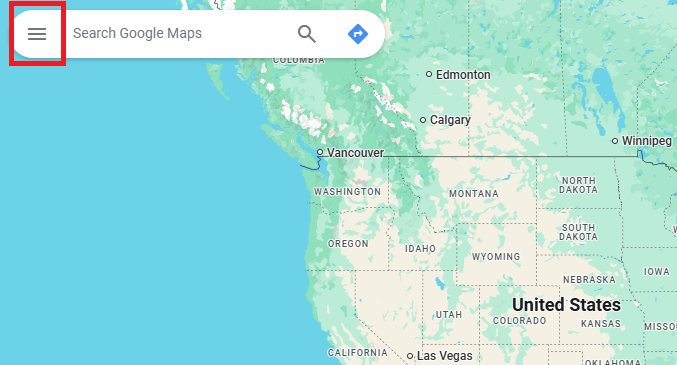
According to Xero, an incredible 50% of millennials in the U.S. want to replace their accountant.
While personal recommendations still hold a lot of weight in this industry, many of these people will use a search engine to find a new accountant.
That’s where search engine optimization (SEO) comes in. If you can rank high on the first page of Google, you’ll likely attract some of these new customers, helping you grow your business.
This article explains what SEO for accountants is and how it works. We’ll also provide clear steps you can take to get it right.
What is SEO for Accountants?
SEO is the techniques and processes involved in ensuring your website ranks high in search results for relevant terms.
The idea is that you make it easy for search engines like Google to understand what your website is about. You also need to provide useful, high-quality content. This helps search engines show the right information to the right people.
Accountants can use SEO to generate new business leads and build their brand by providing authoritative accounting information.
Let’s take a look at some of these benefits in detail.
Why Do Accountants Need SEO?
Here are some of the key reasons accountants should invest in SEO.
Increased website traffic
If someone needs an accountant, they will likely take a personal recommendation.
But what if no one they know can recommend an accountant? In that case, they will probably use a search engine like Google.
Just look at how many people search for these terms each year:
| Search term | Estimated number of searches per year |
| Tax accountant near me | 132,000 |
| Accountant near me | 117,600 |
| Certified public accountant | 67,200 |
Source: Ahrefs
If your website ranks in the top three for popular search terms like these, then there’s a good chance that people will click on them and visit your website.
Ranking in the top three is critical because these results get around 70% of all clicks:
- Page 1 gets 39.8% of clicks
- Page 2 gets 18.7% of clicks
- Page 3 gets 10.2% of clicks
Results on page 2 get less than 1%. 😢
Generate leads
Once people are on your site, you can try to convert them into customers or build a relationship with them.
You could do this by:
💡 Providing them with valuable information so they associate your brand with expert advice.
💡 Providing clear calls to action—for example: “book a free consultation”.
💡 Capturing their contact details through sign-up forms and drip-feeding them email marketing.
Generating leads means more revenue for your business, making it worth the investment.
Speaking of which…
Return on investment
Let’s do a quick calculation on what kind of return you can expect from SEO. Say you provide accountancy services for small businesses, charging $6,500 per year.
You rank number one for the term “certified public accountant”.
- The annual traffic for this term is 67,200.
- You can expect to draw 39.8% of this, that’s 40,454 clicks.
- Suppose you convert 2% of these visitors—that’s 809 new customers per year.
- The average cost of SEO services is around $2,819 per month, or $33,828 per year.
- 809 x 6,500 = 5,258,500
5,258,500 – 33,828 = $5,224,672
That’s incredible ROI!
Even if you rank lower, charge less, or convert fewer customers, the ROI of SEO is still well worth it.
SEO Basics: What do Accountants Need to Know?
SEO can seem very complex. But the basics are relatively straightforward and even making small improvements in your SEO can give you a major advantage.
This section explains what you need to know.
How does search work?
To understand SEO, it’s important to understand how SEO works.
When you type a search term into Google, an algorithm decides which websites and webpages in its index to show the reader and in what order.
What is Google’s index?Google’s index is a bit like a giant directory of websites and webpages. Webpages cannot be found in search if they have not been indexed. Before a page can be added to the index, Google must discover and crawl it. Crawling is essentially when Google tries to understand what your content is about. It’s thought that only a tiny fraction of the internet is indexed. Unfortunately, website owners cannot control when Google crawls and indexes their content. However, they can make it more likely, for example, by following SEO best practices like those outlined in this guide. |
The main factors that Google uses to determine what to show are:
- Relevance: How relevant is your website and pages to the user’s search term.
- Geographic proximity: The closer you are to the searcher the more likely you are to be ranked.
- The quality of your content: Search engines want to show users quality content that answers their queries in depth.
- Your website’s authority: Websites that are established and well-respected in their industry are more likely to be ranked higher.
- User experience factors: Search engines also want to show users websites that will give them a good experience. Therefore, factors such as site speed, mobile friendliness and website structure all contribute to rankings.
That’s just the main ones. In total, Google has around 200 ranking factors.
Accounting is a “Your Money or Your Life” topic
Your Money of Your Life (YMYL) are topics where Google has more stringent requirements regarding the quality of content.
YMYL is any topic where the content can affect the users’:
- Financial well-being
- Health
- Safety
- Happiness
To rank for these subjects on Google webmasters need to focus on expertise, experience, authority and trust (EEAT) signals.
What is EEAT?Experience, Expertise, Authoritativeness, and Trustworthiness (EEAT) are factors Google uses to assess content quality when deciding where to rank pages.
Most accountants will already tick all four boxes—the trick is to reflect this in your content. For example, you might link to your professional accreditations or memberships to prove your expertise. |
8 Ways Accountants Can Boost Their SEO
Here are eight ways you can improve your website’s SEO. We’ve put them in a logical order, so aim to complete them one at a time.
For example, it would be hard to create SEO-optimized content if you haven’t researched target keywords.
-
Set up a Google Business Profile
A Google Business Profile (formerly Google My Business) allows you to control the information Google displays about your accounting firm.
Having a profile means you show up on Google Maps, as well as other local search features.
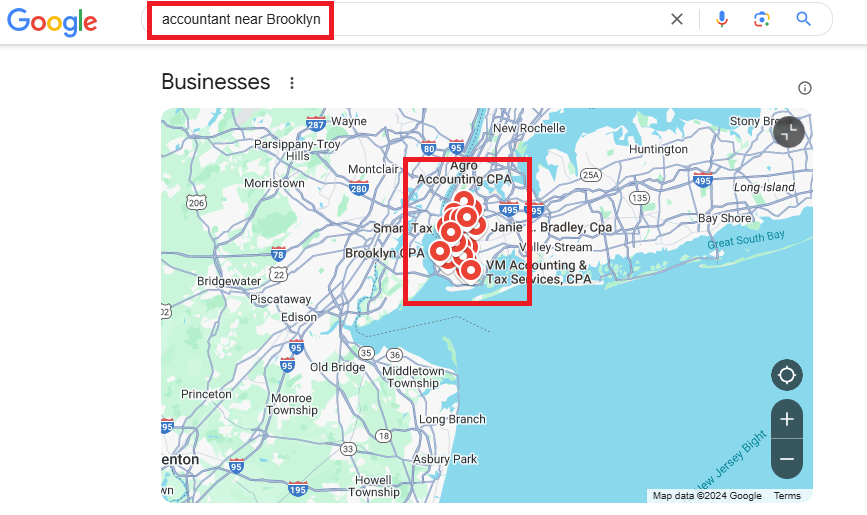
Source: Google
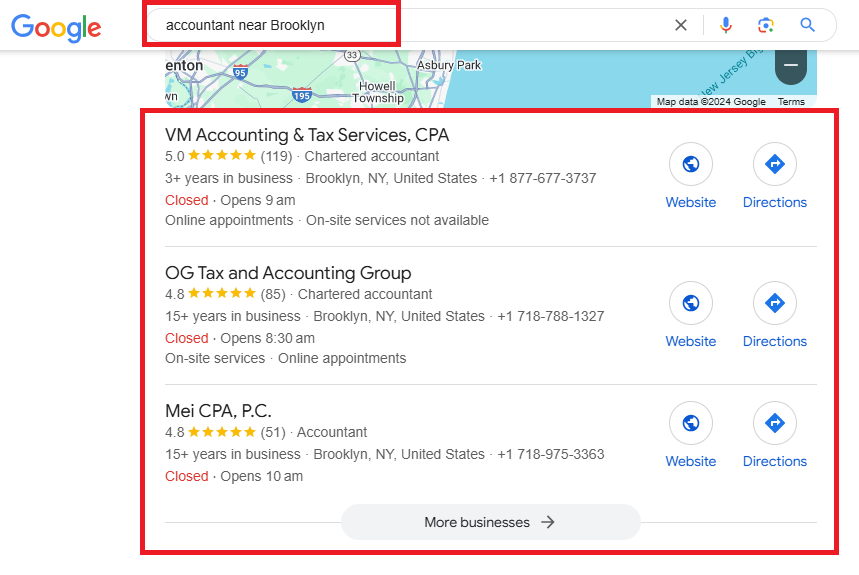
Source: Google
This significantly improves your visibility in search results, helping potential clients find your services.
It also allows your clients to post reviews, allowing you to generate a good reputation and build trust.
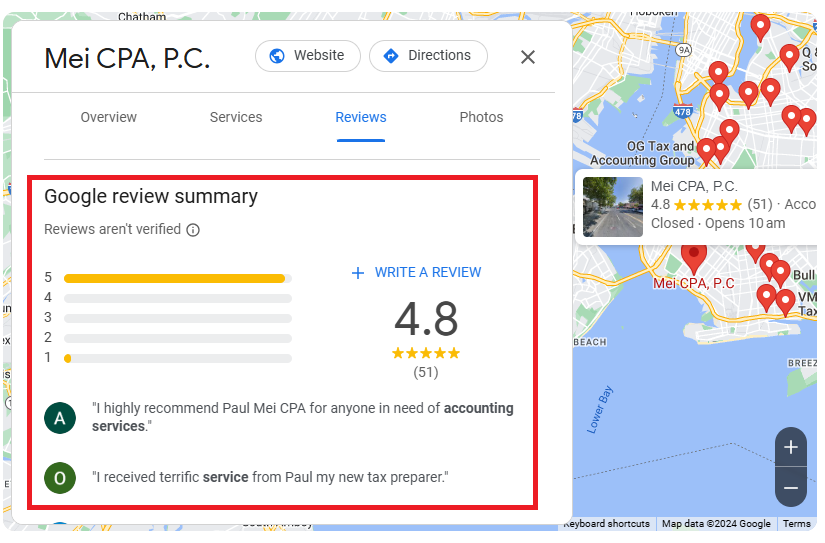
Source: Google
Google considers the following factors when selecting which profiles to display on the map and in results:
🗺️ Relevance: How closely your firm matches the user’s search term.
🗺️ Distance: Your location relative to the user’s location.
🗺️ Prominence: How reputable your firm is, influenced by factors like backlinks.
How to Get Started
- Go to Google Maps and click on the top-left menu. Select “Add your business.”

Source: Google - Sign in or create a Google account for your business.
- Click “Add your business”.

Source: Google - Follow the prompts to add details about your:
- Website
- Business name and location
- Services (like tax preparation, bookkeeping, consulting)
- Contact information and office hours
You can also add photos of your office and choose to let clients contact you via Google.
Tips for Optimizing Your Profile
💡 Provide comprehensive information: Filling out all details boosts visibility and helps clients find the information they need to choose your services.
💡 Keep information updated and accurate: Clients rely on correct contact and service details.
💡 Engage with client reviews: Responding to reviews demonstrates to both Google and potential clients that you’re active and value feedback.
2. Get listed on relevant directories
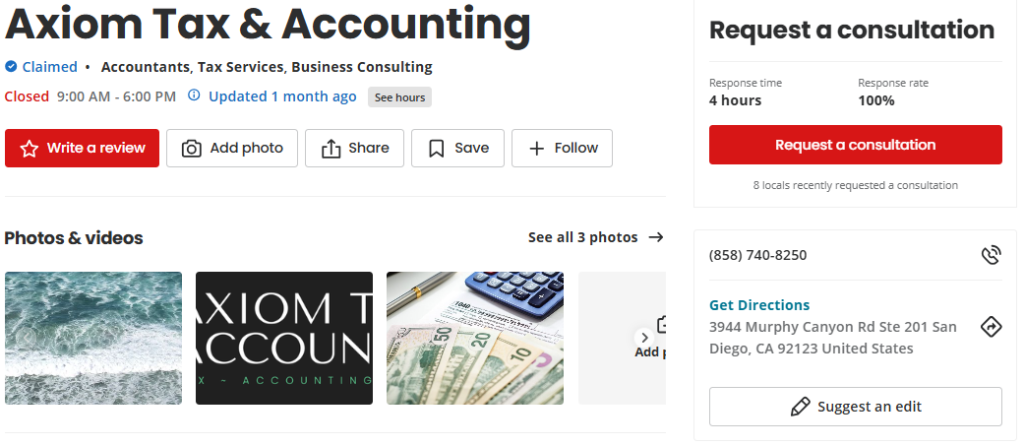
Source: Yelp.co.uk
Being listed in relevant directories is crucial for accountants’ local and general SEO. It enhances visibility, helping potential clients discover your firm while signaling to search engines that your practice is legitimate and active.
It’s also a good source of backlinks—we’ll explain more about this later in the article.
Types of directories to consider include:
- General directories: Platforms like Yelp or Yellow Pages allow any business to register. These sites attract substantial traffic, making your presence beneficial.
- Local directories: These focus on specific geographic areas, aiding search engines in recognizing the regions you serve. For example, a directory like “Your City Business Listings” targets local clientele.
- Specialist accounting directories: These directories specifically connect users with accounting services, whether based on location or service type.
Being featured in these directories boosts your authority with search engines regarding accounting services. For instance, directories like the “Accountant Directory” enable users to find professionals based on location, enhancing your visibility in local searches.
3. Use social proof
Your Google Business profile and directory listings should soon start to generate positive reviews. You can publish and link to these on your website.
This generates trust amongst website visitors and sends strong EEAT signals to Google—if your business generates reviews, it must be a real company with industry experience.
Listing the clients you serve and any case studies or testimonials will also help.
For example, Idaho-based Harris has a section of its home page dedicated to client testimonials.
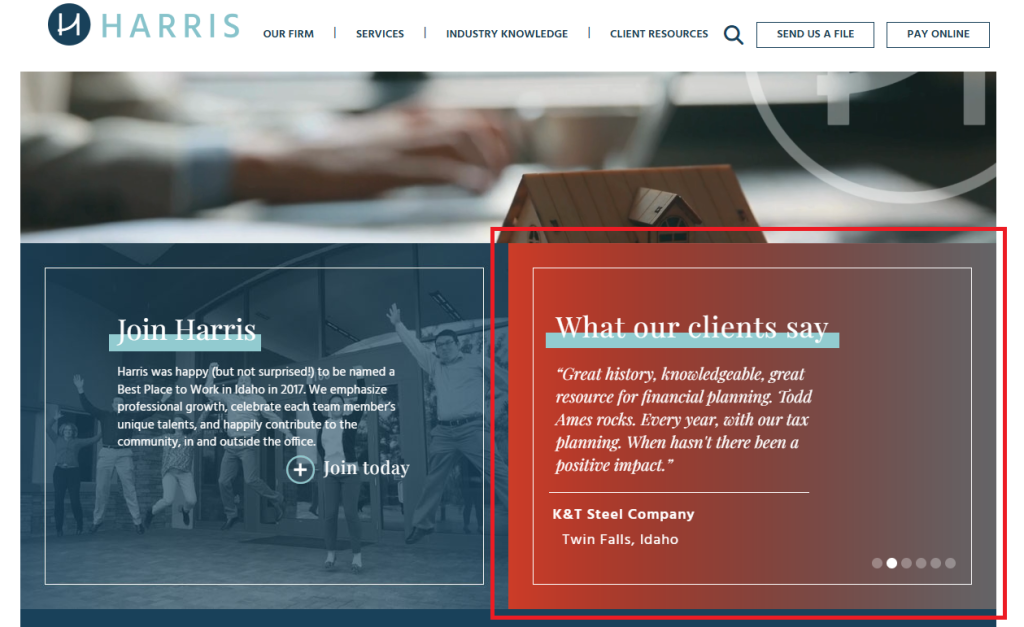
They also list accreditations and memberships in their footer, which further boosts their EEAT.

4. Post on social media
Posting and engaging on social media is another excellent way to send EEAT signals.
It also helps direct organic traffic to your site and grows your brand. Some ways to do this include:
💡 Publish and share useful content.
💡 Engage in conversations.
💡 Communicate with existing and potential clients.
💡 Show the world what your staff are up to. This could include:
- Attending events
- Doing charity work
- Visiting a client
In this example on LinkedIn, Portland-based Perkins & Co has shared a useful reminder of a regulatory update that its clients must comply with.
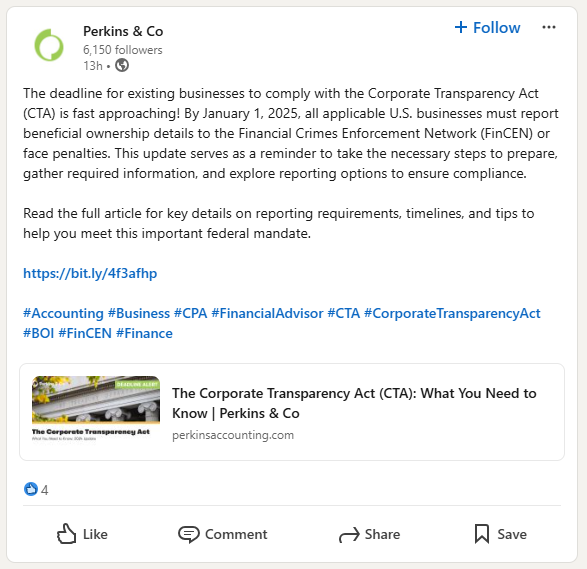
Source: LinkedIn
It includes a link to a guide on its website, so readers can find out more.

Source: Perkins & Co
This is good for several reasons:
✔️ Potential clients will find it helpful
✔️ It shows the company is up-to-date with industry developments
✔️ It directs relevant traffic to the website
✔️ It shows their industry expertise and experience
5. Perform keyword research
Keywords are search terms potential clients use when looking for accounting services, and targeting the right ones can drive relevant traffic to your website.
Here’s a step-by-step guide using the SEO tool Ahrefs to help you conduct keyword research tailored to your accounting practice.
Step 1: Identify Seed Keywords
Start by brainstorming basic keywords or phrases that potential clients might use to find accounting services. These are known as seed keywords and are broad terms that reflect your business. Open Ahrefs’ Keywords Explorer tool, and enter terms like:
- Accountant [Your City]
- Small business accounting
- Tax preparation for [industry]
- Bookkeeping services
- Payroll accounting services
Enter each seed keyword individually or as a group. Ahrefs will provide an overview of each term, helping you see:
💡 Keyword difficulty: A measure of how difficult the keyword is to rank for based on how many other websites target it.
💡 Search volume: How many people search for the term in your country each month.
💡 Traffic potential: How much traffic the top ranking page gets for all of its keywords combined.
💡 Global search volume: How many people search for the term every year worldwide.
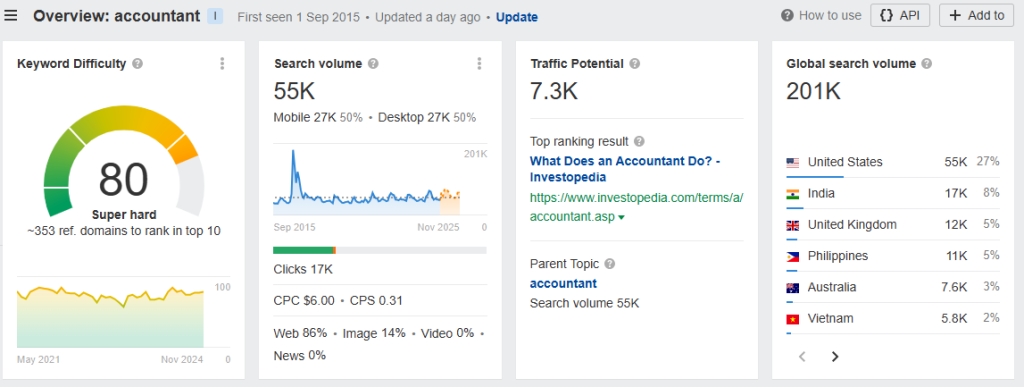
Source: Ahrefs
Step 2: Expand with Long-Tail Keywords
Next, generate long-tail keywords, which are more specific phrases people might use when looking for particular accounting services.
Long-tail keywords are valuable because they generally have lower competition, making them easier to rank for, and they tend to bring in highly targeted traffic.
For instance, while many firms target general terms like “accounting services,” fewer may focus on more niche terms, such as “small business tax preparation in [Your City]” or “nonprofit accounting services.”
Ahrefs’ Keyword Explorer offers various tools to help generate long-tail keywords:

Source: Ahrefs
- Term Matches: Lists keywords containing your seed keyword.
- Questions: Displays search queries related to your keyword framed as questions, which can highlight specific client needs.
- Also Rank For: Shows keywords similar to your target keyword that top-ranking pages are also optimized for.
- Also Talk About: Identifies terms frequently mentioned on pages ranking for your target keyword.

Source: Ahrefs
Add any relevant terms to your keyword list as you go along. You can do this by clicking “Add to” in the top right corner and choosing a keyword list to add it to. Or you can create a new list.
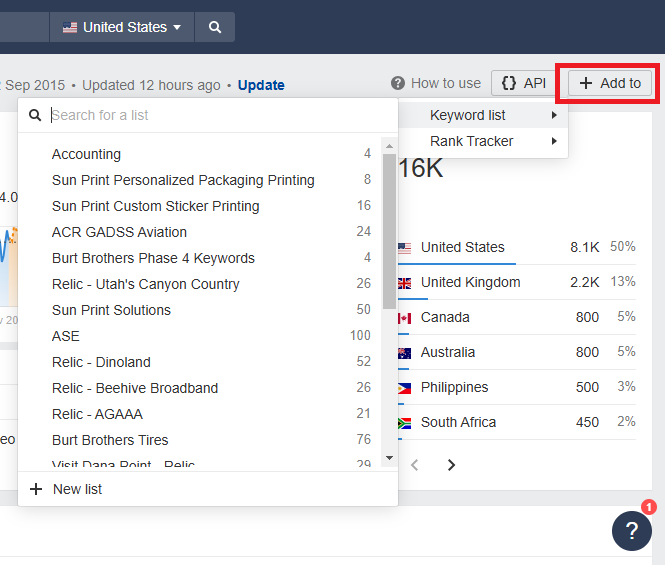
Source: Ahrefs
Step 3: Analyze and Filter Keywords
Once you have a list of potential keywords, it’s time to filter and prioritize them.
The easiest way to do this is to export your keyword list into a spreadsheet. You can do this by clicking on the keyword list in the left menu.

Source: Ahrefs
Click “Export” and choose one of the options.

Source: Ahrefs
The goal is to choose terms that balance relevance, search volume, and ranking difficulty.
Consider the following metrics available in Ahrefs:
- Search Volume: This indicates the average monthly searches a keyword receives. Higher search volume keywords can bring in more visitors, though they may be more competitive. Balancing high and moderate-volume keywords in your list is often effective.
- Keyword Difficulty (KD): Ahrefs’ KD metric estimates how challenging it will be to rank on the first page for a keyword, based largely on backlink counts. Aim for a mix of keywords with lower KD scores for quick wins and higher KD keywords for long-term growth.
- Traffic Potential: This metric shows how much traffic the top-ranking page for a keyword generates, factoring in all keywords that page ranks for. Since a page often ranks for multiple keywords, traffic potential offers a more comprehensive view of a term’s value.
- SERP Overview: Ahrefs provides an analysis of the current top-ranking pages for a keyword, including metrics like Domain Rating (DR), backlink count, and word count. This analysis gives you an idea of the competition and whether your site can compete.
Step 4: Assess Competition
Examining the competition for each keyword helps you evaluate how challenging it will be to rank. In the SERP Overview for each keyword, Ahrefs shows top-ranking pages with details like:
- Domain Rating (DR): This indicates a site’s authority on a scale from 1 to 100. Higher DR websites often rank better, especially for competitive keywords.
- Backlink Profile: Pages with many high-quality backlinks are more likely to rank higher. If top-ranking pages for a keyword have a high number of backlinks, consider focusing on a less competitive keyword or building a strong backlink strategy.
- Content Quality and Length: Check if the top-ranking content is in-depth and well-structured, as longer, comprehensive pages often rank better. Tailoring your content to meet or exceed the quality of top results can help improve rankings.

Source: Ahrefs
Step 5: Refine and Create Your Keyword Strategy
After analyzing your list, create a final shortlist of keywords that have high traffic potential, are relevant to your accounting services, and have manageable competition.
You’ll use this set of keywords as the foundation for your SEO strategy, targeting them throughout your website, including service pages, blog posts, and FAQs.
Additional Tips for Accounting Keyword Research
- Use Industry-Specific Terms: Many accounting clients search for specialized services, like “estate tax planning” or “construction industry bookkeeping.” Including these terms can help you attract clients in specific niches.
- Monitor and Update Keywords: SEO trends change, and client needs evolve. Regularly revisit your keyword list and adjust as needed to stay relevant.
- Consider Local SEO: For accountants, local SEO is crucial. Include keywords with geographic indicators, such as “tax services in [Your City].” Listing your firm in local business directories and setting up a Google Business Profile can further enhance your visibility in local searches.
- Leverage Content Clusters: Structuring content around clusters or themes, such as “tax services” or “bookkeeping for small businesses,” can improve keyword relevancy and help search engines understand the breadth of your services.
6. Create high-quality content
We saw earlier how one accountancy posted useful content on social media as a way to boost its SEO. But posting it on your website will also help improve your rankings.
Here’s why:
- It shows your website is active: Posting regular content shows search engines that your website is active. Search engines use the age of content as a ranking factor, with most preferring new content over old.
- Your content will be indexed quicker: If search engines see that your website is updated regularly, they will crawl it more often. This means new content will be indexed quicker.
- Rank for more keywords: More content means more keywords to rank for, which increases the opportunities for search engine users to come across your website.
- Attract organic traffic: Lots of organic traffic boosts your brand, generates leads, and makes it more likely that your website will rank in searches.
- Attract backlinks: If you write good content, others in your industry will link to it, boosting your SEO.
- More internal linking opportunities: You can post links to other content and pages. This makes it easier for search engines to crawl your website, making it more likely that your content will be discovered and indexed.
Accountants provide a such a wide range of vital services, there’s many types of content clients will find useful, including:
💡 How-to guides
💡 Industry news
💡 Research reports
💡 Videos
💡 Interviews
You can use your keyword research to help work out what questions people are asking online and help to answer them.
For example, BDO has published this article on the tax rules regarding employees’ personal use of company vehicles.
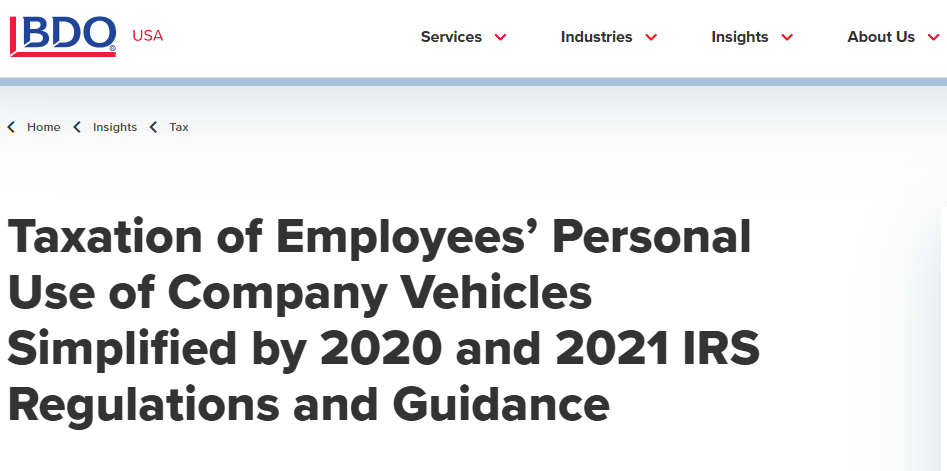
Source: BDO
This might sound niche, but according to Ahrefs, the article attracts 535 visitors per month and ranks in the top 3 for 31 keywords.

In particular, the article is ranking number one for the term “company car tax”.

Carry out on-page optimization
We briefly mentioned on-page SEO at the start of this article. All new and existing content should be optimized to help search engines understand what it is about.
Here’s an overview of the most important on-page optimization elements and how to improve them.
Title tags
The title tag appears as the clickable headline in the SERPs. Create unique, keyword-focused titles under 60 characters. Use action-oriented language to catch the reader’s attention and show how you will fulfill their needs.

Meta descriptions
Meta descriptions provide a brief summary of a page’s content and appear below the title on SERPs.
Write concise, engaging summaries under 160 characters that include primary keywords and encourage users to click through to the page. Notice in the image below what happens if you go over 160 characters.

Headings (H1, H2, H3 tags)
Headings organize content into a hierarchy, with H1 as the main title, and lower levels like H2s and H3s, etc., acting as subheadings. They help readers and search engines understand the page structure.
Use clear, keyword-rich headings to outline the content flow, making the page easier to scan and understand.

Source: The Law Office of Mary King P.L.
Use keywords in content
Using relevant keywords throughout your content helps it match search intent and signals relevance to search engines. Search engines probably won’t scan your whole article, so try to use your target keyword within the first few sentences.
Focus on high-quality, user-centered content that naturally incorporates keywords. Break up text with visuals and concise paragraphs to improve readability.
URL Structure
URLs are the addresses for each page on your site and should give users and search engines a hint about the page’s content.
Keep URLs short, use hyphens to separate words, and include relevant keywords. Descriptive URLs improve SEO by increasing click-through rates and enhancing user experience.
Build Backlinks
Building backlinks is one of the best ways to increase organic traffic and rank higher in search results.
Google’s algorithm measures the quality of your backlinks and uses that as a ranking factor. The quantity of backlinks is less important.
A high-quality backlink is:
- Relevant: The website and page that links to your content must be relevant to it.
- Natural: The backlink must have been placed because it is useful for the linking website’s audience or because the webmaster likes your content.
- Authoritative: The more respected the linking website is in its industry, the higher the link’s quality.
- Reputable: Any website that links to you should be high quality and follow good SEO practices.
- Dofollow: Sometimes backlinks have an HTML tag called “nofollow”. This means the page they link to gets less of a rankings boost. Learn more about nofollow and dofollow links.
Creating high-quality content is one of the best ways to attract backlinks. But there are several other techniques that work well for accountants, including:
Free tools
Accounting often involves lots of complex calculations. And while many of your clients prefer to hand them over to someone else, others like to save money by trying to do it themselves.
Creating free tools allows you to help these people, while also familiarizing them with your brand and expertise. The idea is that they may eventually decide to use an accountant after all—and when they do, they will think of you.
But free tools are also likely to be shared online—for example on pages listing free resources.
Here’s a good example from Jackson Hewitt Tax Services. They have created a calculator that helps people work out their tax refund.
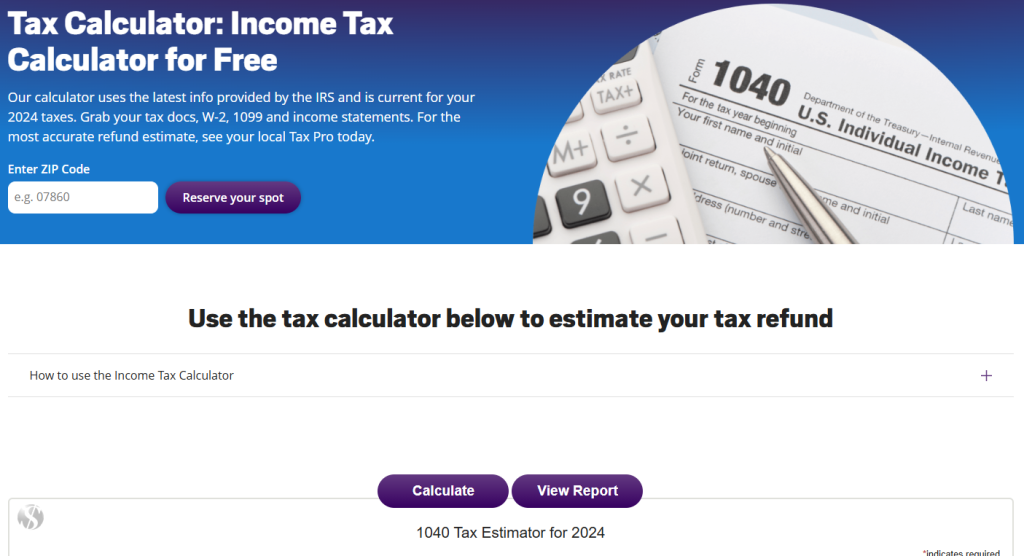
Source: Jackson Hewitt
This has resulted in 874 backlinks (that’s a lot!), including from well-respected websites like Entrepreneur.com, The Washington Examiner and Trinity University.
Want to do the same for your website? Then check out our 7-step guide to creating linkable assets (including tools).
Guest posting
This is when you post content on someone else’s website. Usually you can include a backlink to your website within the guest post.
Guest posting works well for accountants because many industries will be interested in your expert advice.
In this example, accountants Life Stream Business Services have published an article on The Boutique COO—a company that provides business support services to entrepreneurs.
The article provides financial advice to business owners. This makes it a good link—the information is useful to the website’s client base.
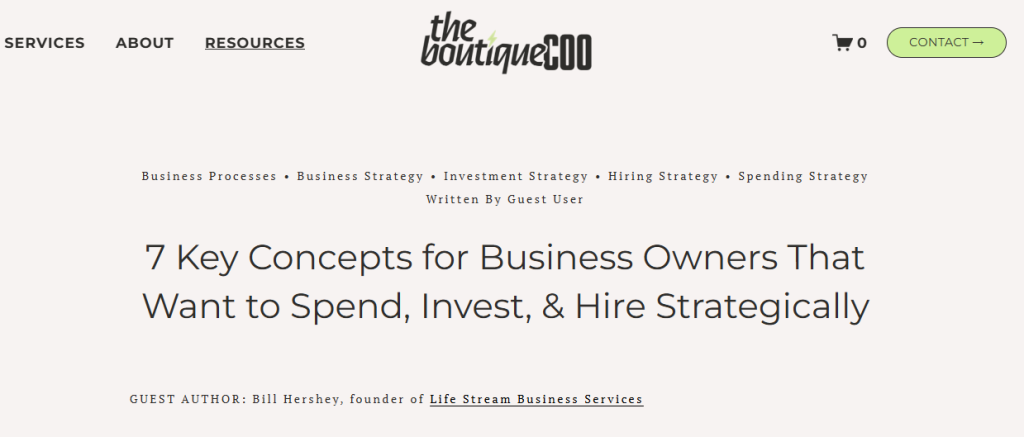
Source: The Boutique COO
Host events
This covers things like:
- Networking events
- Workshops
- Seminars
- Industry roundtables
- Awards
Hosting events like these generates a buzz online. For example, if you host an awards ceremony, most companies or individuals nominated for an award will likely announce it online. They’ll then mention it again when they win the award.

Source: Marcum
Marcum held a free networking event at a local sports event. Attendees might:
- Post on social media that they are excited to attend.
- Ask who else is attending on industry forums.
- Write a blog about the event after.
Digital PR
This is where you build relationships with journalists in a bid to be quoted in relevant news articles. The quote will often include a link back to your website.
Search engines treat media sites as trusted sources. Backlinks from these sites are some of the highest-quality you can get.
Some of the ways to get digital PR backlinks, include:
💡 Publicizing research: Journalists love reporting on surprising or interesting facts and stats. Carrying out and publishing useful research can gain help coverage.
💡 Holding events: This could include an awards ceremony or free day out for families.
💡 Publicity stunts: You could attract attention by doing something unusual. There are several examples where matress companies have paid people to sleep. The main purpose is to generate data for research. However, it also attracts a lot of press backlinks.
💡 Commenting on current events: If there is a major news story or significant development in your industry then you could offer your opinion to a journalist. If you help them multiple times then they might even come to you for your expert insight.
The importance of relationships
Building relationships with journalists is critical to PR link building, but it’s also one of the hardest parts.
Journalists are busy people, often facing tight deadlines, so there is a good chance that your initial messages won’t be read or responded to.
Even then, it can take time to build trust. Journalists have high integrity and only publish content that interests their readers. If your campaign offers no value to their readers and is blatantly launched just to generate coverage, then it’s unlikely to be picked up.
A better approach is to introduce yourself to journalists at relevant publications before attempting to generate publicity. Tell them about:
- Your expertise
- How you can help them and their readers
- What you like about their publication
- How they can contact you
The chances are that your initial email won’t get a response. But once you have sent the initial email, you can reference it when you next get in touch with them. This way they know you are not emailing out of the blue.
How to make building relationships easier
Because building relationships with journalists is difficult, several platforms have been launched that connect journalists with expert sources.
The most popular of these is Connectively (previously known as HARO).
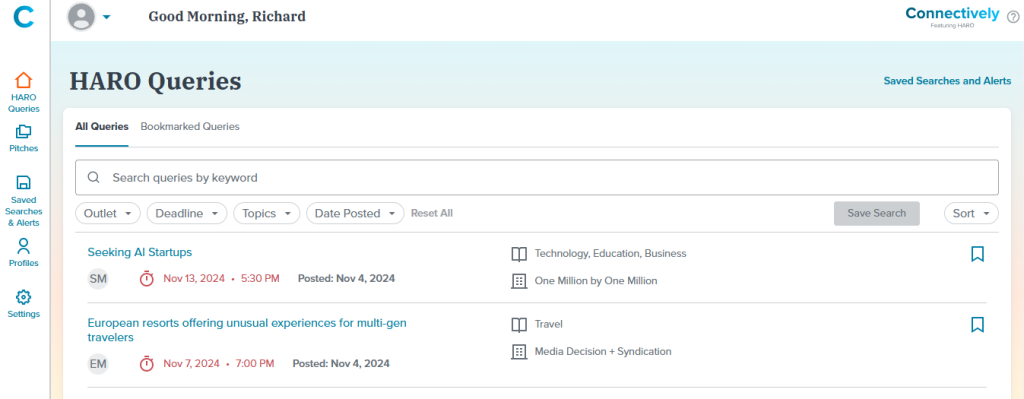
Source: Connectively
However, there are many others, including:
🗞️ Qwoted
🗞️ SourceBottle
🗞️ Featured
Most of these platforms operate similarly. Users can either sign up as a journalist or an expert. Journalists post questions and sources send them responses.
However, there’s no guarantee that your response will lead to a backlink. Journalists are likely to receive many pitches and yours needs to stand out if you are to be quoted.
Here are some tips on how to do that:
✔️ Only respond to questions where you know you can add value. You should either be an expert or have first-hand experience.
✔️ Respond as quickly as possible. Journalists are often on tight deadlines and will usually publish the first decent response they get.
✔️ Briefly introduce yourself in around 50 words and then answer their question directly and succinctly—around 200 words should be enough.
✔️ Offer to provide more information if they need it.
✔️ Always include a link to your website.
Hire Accounting SEO Experts
If done correctly, accounting SEO will drive traffic to your website and become an ongoing source of new client inquiries.
As you discovered in this article, a lot goes into SEO, and finding time to manage it is difficult.
Many larger accountancies choose to hire a team to do SEO for them. But finding the right people can be challenging and you might be worried about the cost of employing someone.
If this is you, then hiring an SEO agency may be a better option. You’ll get an entire team of proven SEO experts that can scale in line with your requirements. Plus, you’ll get it at a fraction of the cost of hiring a team.
That’s where Authority Builders comes in. We’ve been helping companies rank higher in search since 2016.
Authority Builders provides a range of SEO services, including:
🔗 Strategy
🔗 Setting up local citations
🔗 Content creation
🔗 Link building
Read our case study to find out how we helped one accounting business triple its organic traffic by ranking for highly competitive industry terms.
Book a call for information on how we can do the same for you.

